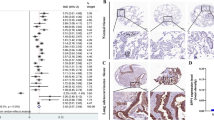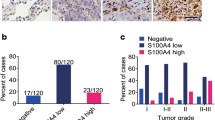Abstract
This study aimed to investigate the expression of secreted phosphoprotein 1 (SPP1) on lung cancer cells and explore its underlying mechanism on autophagy and apoptosis which effect the development of lung cancer cells. GSE19804 related to lung cancer cells was screened from Gene Expression Omnibus (GEO) database, and we screened the 47 pairs of differential expressed mRNAs in lung cancer cells and adjacent tissues using microarray analysis. The expression of the core gene SPP1 was detected by qRT-PCR and western-blot. The transfection efficiency of lung cancer cells was detected by qRT-PCR and the expression of transfected group was tested by western-blot. Cell proliferation after transfection was tested by MTT assay and plate cloning experiment. The apoptosis rate of each transfection group was detected by flow cytometry. We use western-blot to test protein expression of autophagy-related proteins Beclin-1, LC3-I, LC3-II and p62 of each transfected group. Through analysis of GSE19804,the heat map showed SPP1 was the highest expressed in tumor tissues. qRT-PCR and western-blot detected SPP1 expression in lung cancer tissues was higher than that in normal adjacent tissues and was significantly increased in lung cancer cell lines. After transfection with pcDNA3.1-SPP1 (p-SPP1 group), siRNA1-SPP1 (siRNA1 group) and siRNA2-SPP1 (siRNA2 group), showed different expression of SPP1. Up-regulation of SPP1 enhanced cell viability and promoted tumor cell proliferation, while knockdown of SPP1 inhibited tumor cell proliferation. From the results of apoptosis rate, SPP1 inhibited the tumor cell apoptosis. However, in normal lung cell, SPP1 had no effect on cell proliferation and apoptosis. And to test autophagy-related proteins, we found that overexpression of SPP1 inhibited autophagy. High expression of SPP1 inhibited autophagy and apoptosis to promote the development of small cell lung cancer cells.





Similar content being viewed by others
References
Nanavaty P, Alvarez MS, Alberts WM (2014) Lung cancer screening: advantages, controversies, and applications. Cancer Control 21:9–14. https://doi.org/10.1177/107327481402100102
Hasan N, Kumar R, Kavuru MS (2014) Lung cancer screening beyond low-dose computed tomography: the role of novel biomarkers. Lung 192:639–648. https://doi.org/10.1007/s00408-014-9636-z
Malhotra J, Malvezzi M, Negri E, La Vecchia C, Boffetta P (2016) Risk factors for lung cancer worldwide. Eur Respir J 48:889–902. https://doi.org/10.1183/13993003.00359-2016
Zhu J, Zeng Y, Xu C, Qin H, Lei Z, Shen D, Liu Z, Huang JA (2015) Expression profile analysis of microRNAs and downregulated miR-486-5p and miR-30a-5p in non-small cell lung cancer. Oncol Rep 34:1779–1786. https://doi.org/10.3892/or.2015.4141
He C, Klionsky DJ (2009) Regulation mechanisms and signaling pathways of autophagy. Annu Rev Genet 43:67–93. https://doi.org/10.1146/annurev-genet-102808-114910
Nikoletopoulou V, Markaki M, Palikaras K, Tavernarakis N (2013) Crosstalk between apoptosis, necrosis and autophagy. Biochim Biophys Acta 1833:3448–3459. https://doi.org/10.1016/j.bbamcr.2013.06.001
Yang ZJ, Chee CE, Huang S, Sinicrope F (2011) Autophagy modulation for cancer therapy. Cancer Biol Ther 11:169–176. https://doi.org/10.4161/cbt.11.2.14663
Mathew R, Karantza-Wadsworth V, White E (2007) Role of autophagy in cancer. Nat Rev Cancer 7:961–967. https://doi.org/10.1038/nrc2254
Gordy C, He YW (2012) The crosstalk between autophagy and apoptosis: where does this lead? Protein Cell 3:17–27. https://doi.org/10.1007/s13238-011-1127-x
Torre LA, Bray F, Siegel RL, Ferlay J, Lortet-Tieulent J, Jemal A (2015) Global cancer statistics, 2012. CA Cancer J Clin 65:87–108. https://doi.org/10.3322/caac.21262
Heymann JJ, Bulman WA, Swinarski D, Pagan CA, Crapanzano JP, Haghighi M, Fazlollahi L, Stoopler MB, Sonett JR, Sacher AG, Shu CA, Rizvi NA, Saqi A (2017) PD-L1 expression in non-small cell lung carcinoma: comparison among cytology, small biopsy, and surgical resection specimens. Cancer 125:896–907. https://doi.org/10.1002/cncy.21937
Gozuacik D, Kimchi A (2004) Autophagy as a cell death and tumor suppressor mechanism. Oncogene 23:2891–2906. https://doi.org/10.1038/sj.onc.1207521
Ogier-Denis E, Codogno P (2003) Autophagy: a barrier or an adaptive response to cancer. Biochim Biophys Acta 1603:113–128
Marino G, Niso-Santano M, Baehrecke EH, Kroemer G (2014) Self-consumption: the interplay of autophagy and apoptosis. Nat Rev Mol Cell Biol 15:81–94. https://doi.org/10.1038/nrm3735
Marino G, Lopez-Otin C (2004) Autophagy: molecular mechanisms, physiological functions and relevance in human pathology. Cell Mol Life Sci 61:1439–1454. https://doi.org/10.1007/s00018-004-4012-4
Zhang M, Jiang M, Bi Y, Zhu H, Zhou Z, Sha J (2012) Autophagy and apoptosis act as partners to induce germ cell death after heat stress in mice. PLoS One 7:e41412. https://doi.org/10.1371/journal.pone.0041412
Maiuri MC, Le Toumelin G, Criollo A, Rain JC, Gautier F, Juin P, Tasdemir E, Pierron G, Troulinaki K, Tavernarakis N, Hickman JA, Geneste O, Kroemer G (2007) Functional and physical interaction between Bcl-X(L) and a BH3-like domain in Beclin-1. EMBO J 26:2527–2539. https://doi.org/10.1038/sj.emboj.7601689
Wirawan E, Lippens S, Vanden Berghe T, Romagnoli A, Fimia GM, Piacentini M, Vandenabeele P (2012) Beclin1: a role in membrane dynamics and beyond. Autophagy 8:6–17. https://doi.org/10.4161/auto.8.1.16645
Tanida I, Ueno T, Kominami E (2004) LC3 conjugation system in mammalian autophagy. Int J Biochem Cell Biol 36:2503–2518. https://doi.org/10.1016/j.biocel.2004.05.009
Kabeya Y, Mizushima N, Ueno T, Yamamoto A, Kirisako T, Noda T, Kominami E, Ohsumi Y, Yoshimori T (2000) LC3, a mammalian homologue of yeast Apg8p, is localized in autophagosome membranes after processing. EMBO J 19:5720–5728. https://doi.org/10.1093/emboj/19.21.5720
Ichimura Y, Komatsu M (2010) Selective degradation of p62 by autophagy. Semin Immunopathol 32:431–436. https://doi.org/10.1007/s00281-010-0220-1
Acknowledgments
This study was supported by Shandong Province Science and Technology Public Relations (No.2012GGE27122) and Science and Technology Program Project of Jinan (No. 201704093).
Funding
This study was funded by Shandong Province Science and Technology Public Relations (No.2012GGE27122) and Science and Technology Program Project of Jinan (No. 201704093).
Author information
Authors and Affiliations
Corresponding author
Ethics declarations
Conflict of Interest
The authors declare that they have no conflict of interest.
Ethical Approval
All procedures performed in studies involving human participants were in accordance with the ethical standards of Qilu Hospital of Shandong University.
Informed Consent
Informed consent was obtained from all individual participants included in the study.
Rights and permissions
About this article
Cite this article
Liu, H., Wei, S., Zhang, L. et al. Secreted Phosphoprotein 1 Promotes the Development of Small Cell Lung Cancer Cells by Inhibiting Autophagy and Apoptosis. Pathol. Oncol. Res. 25, 1487–1495 (2019). https://doi.org/10.1007/s12253-018-0504-7
Received:
Accepted:
Published:
Issue Date:
DOI: https://doi.org/10.1007/s12253-018-0504-7




